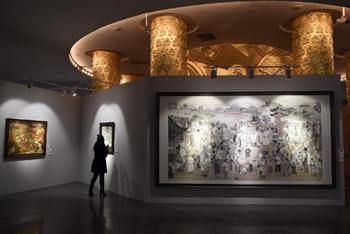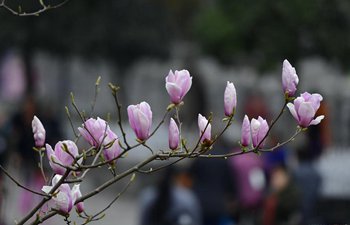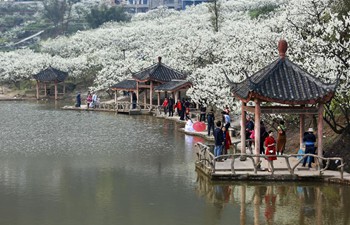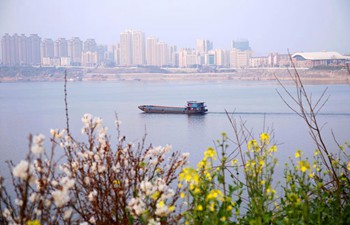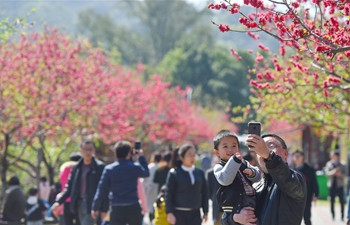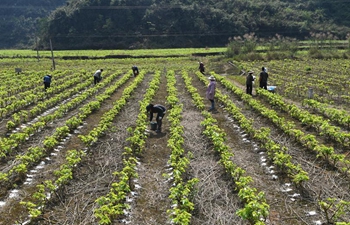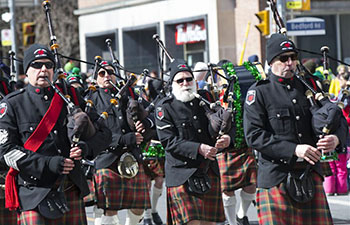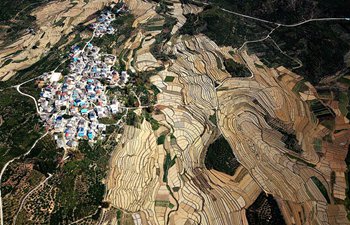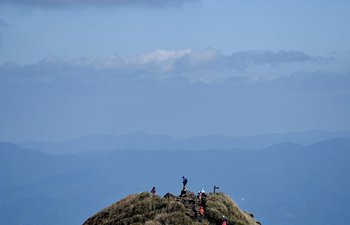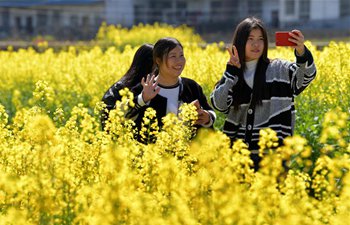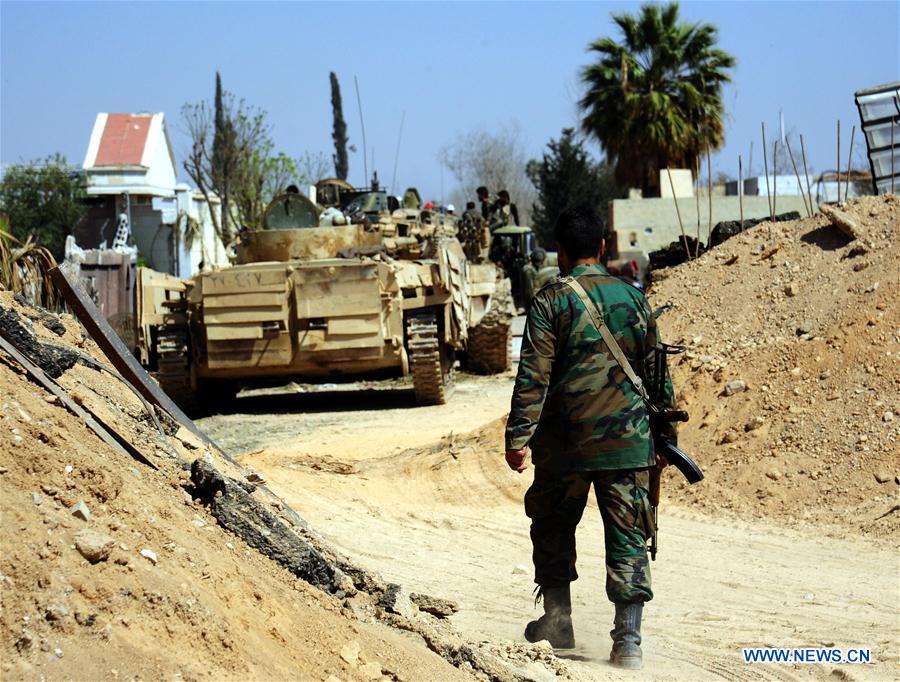
A Syrian soldier walks toward an armored vehicle in the town of Aftaris in Damascus' Eastern Ghouta countryside, Syria, on March 12, 2018. Syrian army captured on Monday the town of Aftaris in Eastern Ghouta, the latest town to be retaken by the army during the wide-scale offensive in that area, state news agency SANA said. (Xinhua/Ammar Safarjalani)
DAMASCUS, March 13 (Xinhua) -- After being trapped in the Eastern Ghouta countryside of Damascus for six years, civilians who managed to evacuate the rebel-held areas could finally breathe a sigh of relief.
In every war, the civilians seem to be those suffering most and the scars left are so deep that their lives are full of sorrowful memories.
For the civilians leaving rebel-held areas in Eastern Ghouta, what they could hardly forget is the tough living conditions in their hometowns where they suffer from the lack of medicine and food amid the ongoing military showdown.
A total of 146 civilians, 44 women, 24 men and 78 children, left rebel-held areas in Eastern Ghouta on Tuesday after long days of waiting to move to safe places.
The civilians, mainly people with medical conditions and children, reached the government-controlled Wafidin area in the northeast of Damascus through a humanitarian corridor set up between Wafidin and the adjacent rebel-held Douma district in Eastern Ghouta.
Those civilians are from different parts of Eastern Ghouta but gathered in Douma before crossing into Wafidin.
It is the first major civilian convoy to leave the area since the corridor was set up 14 days ago for the evacuation of civilians after a Russian-backed humanitarian pause went into force.
The civilians were taken to a temporary shelter at a school in the Wafidin area, where the children were vaccinated immediately.
At the temporary shelter, where civilians were waiting for their documents to be processed and to get medical checkups, some infants were seen receiving medicine drips through their noses.
The facial expressions of the grownups were a mix of confusion and exhaustion as it's their first time to leave Eastern Ghouta to a place where they are promised to be well-treated.
Noura Rayyes was sitting with her brother and sister, waiting for their mother to finish her medical examination at an ambulance outside.
She told Xinhua that they were happy to get out of Ghouta because her mother needs emergency surgery but there is no medical help in Eastern Ghouta.
"The situation of my mother has become very bad and we couldn't treat her inside Ghouta with the lack of medication, not to mention the soaring prices and the lack of everything else," Noura said.
Samya Jaber, another evacuee who managed to leave Eastern Ghouta with her father and three children, said she was desperate to have her critically ill father get access to medication.
"Our situation was very bad inside, with no food or any life necessities. Thankfully we registered our names and were evacuated by the Syrian Arab Red Crescent. The people here are treating us well but we still have families inside who couldn't leave," she said.
Sitting next to his daughter and son, Jamal Hashem pointed to the head of his daughter which was wrapped in a bandage, saying most of the evacuees on Tuesday were either in need of medical help or accompanying relatives and family members who need medical care.
"The civilians inside Eastern Ghouta wish to leave that area because of the hard living conditions, soaring prices as well as fear and panic," he said.
The evacuation of civilians from Ghouta came a day after the Islam Army, the major rebel group in the Eastern Ghouta, announced a deal with Russia over the evacuation of the wounded from the area.
The rebel group said in a statement that an agreement has been reached with Russians to allow the UN to evacuate wounded people out of Eastern Ghouta for medical treatment.
The evacuation will take place in batches, it added.
"The agreement comes as a result of the government siege on areas in Eastern Ghouta, with the lack of medication and "targeting of medical facilities," the statement claimed.
The Islam Army is a Saudi-backed rebel group mainly positioned in the Douma district in northern Eastern Ghouta.
The situation in Eastern Ghouta has flared up since late February following a wide-scale military operation by the Syrian army to dislodge al-Qaida-linked groups from the area.
On Sunday, the Syrian army split Eastern Ghouta into three parts, by tightening the siege on Douma in the north, the city of Harasta in the west and other towns and villages south of the region.
Eastern Ghouta, a 105-square-km agricultural region consisting of several towns and farmlands, constitutes the last threat to Damascus given its proximity to government-controlled neighbourhoods east of the capital and continuing mortar attacks on residential areas there.
Four major rebel groups are currently positioned inside Eastern Ghouta, namely the Islam Army, Failaq al-Rahman, Ahrar al-Sham, and the Levant Liberation Committee, known as the al-Qaida-linked Nusra Front.
The UN humanitarian agencies have sounded the alarm about the worsening humanitarian situation for 400,000 people in Eastern Ghouta, where activists said around 1,000 have been killed since a military showdown between rebels and the government late February.




